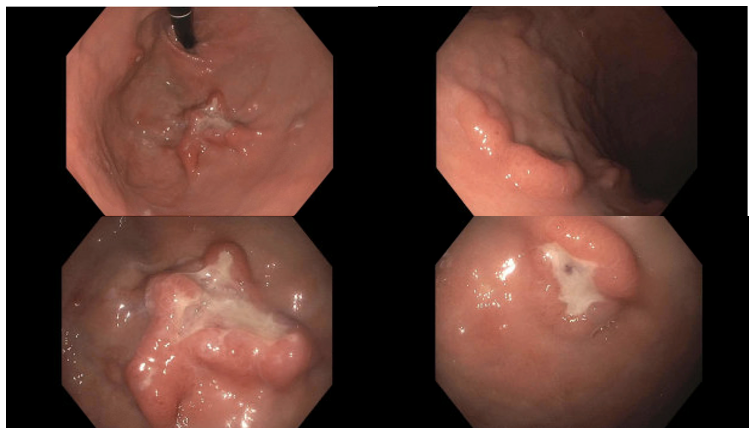Monday Poster Session
Category: Stomach and Spleen
P4228 - Incidental Finding of Diffuse Large B-Cell Lymphoma With Gastric Metastasis in the Setting of Recent EBV Infection
Monday, October 27, 2025
10:30 AM - 4:00 PM PDT
Location: Exhibit Hall

Andrew Harris, DO
Oklahoma State University Center for Health Sciences
Tulsa, OK
Presenting Author(s)
Andrew Harris, DO1, Hayden Crawford, BS2, Reagan Livingston, DO2, Vasudevan Raghuraman, MD2, Natalie Turner, DO2
1Oklahoma State University Center for Health Sciences, Tulsa, OK; 2Oklahoma State University, Tulsa, OK
Introduction: Lymphoma is a malignancy of lymphocytes including T cells, B cells and natural killer (NK) cells. Diffuse large B cell lymphoma (DLBCL) is part of the non-hodgkin lymphoma subtype. These malignancies spread hematogenously which is why they are typically discovered incidentally as advanced masses or enlarging lymph nodes. The gastrointestinal tract is the most common primary location of extra-nodal involvement of DLBCL. Here we present the case of a 72 year old female with a recent Epstein Barr Virus (EBV) infection that presented with upper GI bleeding and was found to have multiple ulcerated nodules in the gastric fundus and body with pathology review confirming DLBCL.
Case Description/
Methods: A 72 year old female with a past medical history of GERD and chronic kidney disease presented to the emergency department for hematemesis. She reported painful lymph nodes in her neck as well as unintentional weight loss for three months. She had been diagnosed with a recent EBV infection three months prior to admission. Initial laboratory findings were significant for a hemoglobin 6.3. A CT of the abdomen as well as a CT of the neck revealed diffuse cervical and axillary lymphadenopathy with splenomegaly.
The Gastroenterology service was consulted and performed an EGD which revealed multiple ulcerated nodular lesions in the gastric fundus and body. Biopsies resulted positive for diffuse large B cell lymphoma (DLBCL). A lymph node and bone marrow biopsy were performed which confirmed the diagnosis of DLBCL. Oncology was consulted and promptly initiated chemotherapy.
She was subsequently hospitalized multiple times, eventually requiring mechanical ventilation for an acute COVID-19 infection. The family decision was made to transition to comfort care and she shortly passed away.
Discussion: Diffuse large B cell lymphoma (DLBCL) is a primarily aggressive type of lymphoma. It is often discovered incidentally at an advanced stage. A particularly rare subtype of DLBCL is EBV-positive DLBCL, which is more common in immunocompromised patients, such as those with HIV or a history of organ transplantation. Our patient tested positive for a recent or reactivated EBV infection approximately three months prior to her diagnosis of DLBCL. IGg levels of EBV can remain elevated for an individual's lifetime; however, it should be noted that elevated IGg levels of EBV in the setting of a new diagnosis of DLBCL should raise clinical suspicion for an aggressive subset of lymphoma.

Figure: Multiple nodular lesions was found in the gastric fundus and in the gastric body. A few with ulceration with white pearly edges. One with a non-bleeding visible vessel.
Disclosures:
Andrew Harris indicated no relevant financial relationships.
Hayden Crawford indicated no relevant financial relationships.
Reagan Livingston indicated no relevant financial relationships.
Vasudevan Raghuraman indicated no relevant financial relationships.
Natalie Turner indicated no relevant financial relationships.
Andrew Harris, DO1, Hayden Crawford, BS2, Reagan Livingston, DO2, Vasudevan Raghuraman, MD2, Natalie Turner, DO2. P4228 - Incidental Finding of Diffuse Large B-Cell Lymphoma With Gastric Metastasis in the Setting of Recent EBV Infection, ACG 2025 Annual Scientific Meeting Abstracts. Phoenix, AZ: American College of Gastroenterology.
1Oklahoma State University Center for Health Sciences, Tulsa, OK; 2Oklahoma State University, Tulsa, OK
Introduction: Lymphoma is a malignancy of lymphocytes including T cells, B cells and natural killer (NK) cells. Diffuse large B cell lymphoma (DLBCL) is part of the non-hodgkin lymphoma subtype. These malignancies spread hematogenously which is why they are typically discovered incidentally as advanced masses or enlarging lymph nodes. The gastrointestinal tract is the most common primary location of extra-nodal involvement of DLBCL. Here we present the case of a 72 year old female with a recent Epstein Barr Virus (EBV) infection that presented with upper GI bleeding and was found to have multiple ulcerated nodules in the gastric fundus and body with pathology review confirming DLBCL.
Case Description/
Methods: A 72 year old female with a past medical history of GERD and chronic kidney disease presented to the emergency department for hematemesis. She reported painful lymph nodes in her neck as well as unintentional weight loss for three months. She had been diagnosed with a recent EBV infection three months prior to admission. Initial laboratory findings were significant for a hemoglobin 6.3. A CT of the abdomen as well as a CT of the neck revealed diffuse cervical and axillary lymphadenopathy with splenomegaly.
The Gastroenterology service was consulted and performed an EGD which revealed multiple ulcerated nodular lesions in the gastric fundus and body. Biopsies resulted positive for diffuse large B cell lymphoma (DLBCL). A lymph node and bone marrow biopsy were performed which confirmed the diagnosis of DLBCL. Oncology was consulted and promptly initiated chemotherapy.
She was subsequently hospitalized multiple times, eventually requiring mechanical ventilation for an acute COVID-19 infection. The family decision was made to transition to comfort care and she shortly passed away.
Discussion: Diffuse large B cell lymphoma (DLBCL) is a primarily aggressive type of lymphoma. It is often discovered incidentally at an advanced stage. A particularly rare subtype of DLBCL is EBV-positive DLBCL, which is more common in immunocompromised patients, such as those with HIV or a history of organ transplantation. Our patient tested positive for a recent or reactivated EBV infection approximately three months prior to her diagnosis of DLBCL. IGg levels of EBV can remain elevated for an individual's lifetime; however, it should be noted that elevated IGg levels of EBV in the setting of a new diagnosis of DLBCL should raise clinical suspicion for an aggressive subset of lymphoma.

Figure: Multiple nodular lesions was found in the gastric fundus and in the gastric body. A few with ulceration with white pearly edges. One with a non-bleeding visible vessel.
Disclosures:
Andrew Harris indicated no relevant financial relationships.
Hayden Crawford indicated no relevant financial relationships.
Reagan Livingston indicated no relevant financial relationships.
Vasudevan Raghuraman indicated no relevant financial relationships.
Natalie Turner indicated no relevant financial relationships.
Andrew Harris, DO1, Hayden Crawford, BS2, Reagan Livingston, DO2, Vasudevan Raghuraman, MD2, Natalie Turner, DO2. P4228 - Incidental Finding of Diffuse Large B-Cell Lymphoma With Gastric Metastasis in the Setting of Recent EBV Infection, ACG 2025 Annual Scientific Meeting Abstracts. Phoenix, AZ: American College of Gastroenterology.
